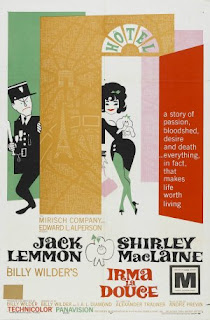 I mention all of this so that when I say that Irma La Douce is too long, people won't think that statement is a given just because it came out forty-eight years ago. Irma La Douce is too long simply because it's too damn long, and because what starts out as an enjoyable if silly movie devolves into utter ridiculousness by the time its two and a half hours are up. Released in 1963, it is director Billy Wilder's adaptation of a musical play by Alexandre Breffort, and part of the problem is that it maintains the musical's fantastic aspects without maintaining any of the actual, you know, music. This is charming at first, presenting a candy-colored but not necessarily unrealistic vision of Paris in the middle of the twentieth century, full of loud hookers and bumbling police and winky barmen who believe in living life to its fullest, but it wears thin as soon as an actual story starts to cohere and the natural tension between fantasy and reality explodes all over the screen. The thing about writing fantasy is that you can do just about anything you want, from talking animals to talking planets, so long as you abide by the rules you establish at the story's outset; as soon as you break those rules, you're done; you've lost credibility. A story doesn't have to have any basis in reality, but it has to make its own kind of sense.
I mention all of this so that when I say that Irma La Douce is too long, people won't think that statement is a given just because it came out forty-eight years ago. Irma La Douce is too long simply because it's too damn long, and because what starts out as an enjoyable if silly movie devolves into utter ridiculousness by the time its two and a half hours are up. Released in 1963, it is director Billy Wilder's adaptation of a musical play by Alexandre Breffort, and part of the problem is that it maintains the musical's fantastic aspects without maintaining any of the actual, you know, music. This is charming at first, presenting a candy-colored but not necessarily unrealistic vision of Paris in the middle of the twentieth century, full of loud hookers and bumbling police and winky barmen who believe in living life to its fullest, but it wears thin as soon as an actual story starts to cohere and the natural tension between fantasy and reality explodes all over the screen. The thing about writing fantasy is that you can do just about anything you want, from talking animals to talking planets, so long as you abide by the rules you establish at the story's outset; as soon as you break those rules, you're done; you've lost credibility. A story doesn't have to have any basis in reality, but it has to make its own kind of sense.Then, suddenly, in the film's last act, not only do the wheels come off, they give way to jet packs powered by unicorn farts that rocket the story straight to the moon. Suddenly the cop can bend steel bars; suddenly he can hold his breath under water indefinitely; suddenly the police can't recognize the man they're looking for because he's wearing one of their uniforms. Suddenly we're watching a full-out farce instead of a light comedy. The end of Irma La Douce is an absolute mess, and not even a funny mess; the comedy that buoys the rest of the film gives way to an off-putting strangeness that can only hope to make you laugh because it makes so little sense. Irma is pregnant! She's having the baby at the altar! The police force wants the cop back because...because! The whole progression is a non sequitur, like if I suddenly ended this review on a positive note!
Jack Lemmon and Shirley MacLaine both give great performances, that's for sure.
Grade: C+
No comments:
Post a Comment